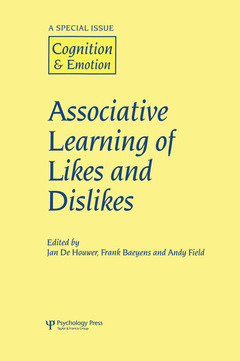Description
Associative Learning of Likes and Dislikes
A Special Issue of Cognition and Emotion
Special Issues of Cognition and Emotion Series
Coordinators: de Houwer Jan, Baeyens Frank, Field Andy
Language: English
Subject for Associative Learning of Likes and Dislikes:
Keywords
IAPS Rating; IAT Effect; Picture Picture Paradigm; EC Effect; Affective Priming Procedure; EC Study; EC; EC Research; De Houwer; Contingency Awareness; Standard EC; Find Transfer Effects; CS Evaluation; Affective Priming Task; Dual Process Accounts; Cue Competition; Associative Transfer; EC Paradigm; Occasion Setting; CS Neutrality; Transfer Effect; Affective Learning; Attitude Formation Processes; Extinction Phase; Evaluative Learning
Publication date: 06-2015
· 15.6x23.4 cm · Paperback
Publication date: 02-2005
· 15.6x23.4 cm · Hardback
Description
/li>Contents
/li>Biography
/li>Comment
/li>
J. De Houwer, F. Baeyens, A. Field, Associative Learning of Likes and Dislikes: Some Current Controversies and Possible Ways Forward. E. Walther, B. Nagengast, C. Trasselli, Evaluative Conditioning in Social Psychology: Facts and Speculations. M. Hammerl, E.P. Fulcher, Reactance in Affective-evaluative Learning: Outside of Conscious Control? A.P. Field, A.C. Moore, Dissociating the Effects of Attention and Contingency Awareness on Evaluative Conditioning Effects in the Visual Paradigm. E. Diaz, G. Ruis, F. Baeyens, Resistance to Extinction of Human Evaluative Conditioning Using a Between-subjects Design. O.V.Lipp, H.M. Purkis, No Support for Dual Process Accounts of Human Affective Learning in Simple Pavlovian Conditioning. T. Meersmans, J. De Houwer, F. Baeyens, T. Randell, P. Eelen, Beyond Evaluative Conditioning: Searching for Associative Transfer of Non-evaluative Stimulus Properties.




